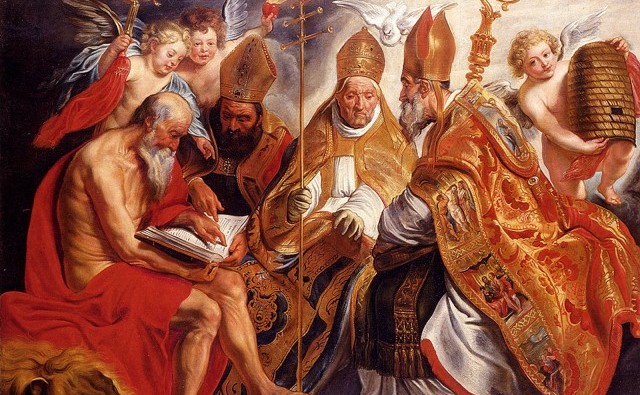We’ve almost crossed the fifty page mark in our ‘whirlwind’ tour through Barth’s Evangelical Theology. At this rate, we’ll finish the two-hundred page book around the time I finish the PhD. Nonetheless, we forge ahead. Barth’s chapter on “The Community” raises two significant issues – 1) the role of theology in the Church, and 2) the role tradition plays in the Church and its theology.
Barth suggests that the church exists because it was called into being by the Word, then continued to be called into being by the Word’s witnesses. This call originally came through their preaching, but continues through their writing. And the church today is called to continue to witness to the Word not only through ‘silent’ acts of compassion, but also through continued proclamation. Now one might quibble with how silent compassion really is, but most would agree that there is an important relationship between gospel actions and gospel preaching. Jesus and the early church did both in abundance, and my guess is there was never a question of one taking priority over the other.
But that’s not the issue with which Barth is wrestling. He is more concerned with making clear the role ‘theology’ is meant to play in that. Barth’s main point is that theology is meant to serve the church by providing a guide to its proclamation. He suggests that when the church’s speech is ill informed by theology, “Instead of being helpful, it can be obstructive to God’s cause in the world by an understanding that is partly wrong or wholly wrong, by devious or warped thought, by silly or too subtle speech.” Another way of saying this is that proclamation of the Word inevitably involves making theological claims about the Word, and when a church isn’t theologically self-reflective it comes to bear in its preaching (and I would add, to the life of the community as a whole). Good theology doesn’t guarantee good preaching, but bad theology inevitably leads to bad preaching.
Now it is too easy for one to make lofty claims about what theology is suppose to do and be in the life of the church, and so Barth reminds us that theology is for the church. In his own words…
“Theology would be an utter failure if it should place itself in some elegant eminence where it would be only concerned with God, the world, man, and some other items, perhaps those of historical interest, instead of being theology for the community.”
The church is served by theology when careful theological reflection is taken seriously within and for the church. My own sense is that some church cultures view theology with a certain amount of suspicion. Some of the wariness is undoubtedly deserved. In as much as theology is self-absorbed and cares little for the life of church, then the criticism is warranted. However, to simply write off theology because it is overly concerned with ‘right’ thinking and ‘abstract’ concepts is a (theological) decision that doesn’t serve the church very well. The theology of “non-theological” churches could undoubtedly use some revisiting.
In the same way that churches run the temptation of loosing themselves from the fetters of theology, or at least a certain kind of theology, Barth recognizes (or anticipates) a similar mistake with regard to tradition. In fact, given that so much of theology is embedded within tradition, in some ways it is one and the same move. This may be why Barth makes similar statements about the way tradition is meant to function in the thinking and life of the church. The church is meant to ‘trust’ it, ‘respect’ it, ‘learn’ from it (which also assumes it will learn it). By the same token, tradition – like theology – serves the church by informing its theology, preaching, and practice while not lording over it. Hence the statement, “There is no heterodoxy worse than such orthodoxy!”
Now I’m no contemporary-church basher. My beloved home church would be on the ‘cutting edge’ of a host of church-y things. But in as much as the evangelical church in America thinks that it is the first church to get it right since the Bible was written, it is not unlike the adolescent who thinks he/she has nothing to learn from a parent. Some children grow out of that phase, while others carry the adolescent mindset all the way through adulthood. In the States, a society that is in many ways obsessed with youthfulness and adolescent culture, the church’s tendency towards fadishness and style over substance comes across as especially juvenile. Both child and parent are well-served when they attend to the Word that binds them.

